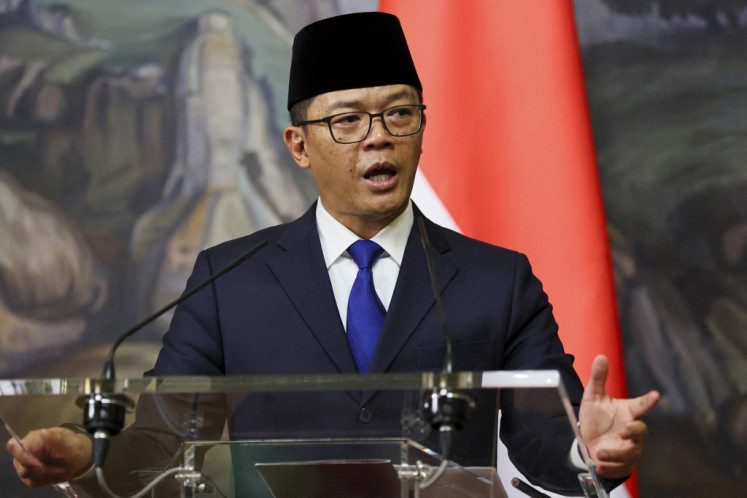Popular Reads
Top Results
Can't find what you're looking for?
View all search resultsPopular Reads
Top Results
Can't find what you're looking for?
View all search resultsEconomic populism too costly for Indonesia
Globalization is undoubtedly in a difficult phase
Change text size
Gift Premium Articles
to Anyone

G
lobalization is undoubtedly in a difficult phase. In the Western world, it is often seen as a force that destroys manufacturing jobs, while populists in emerging economies consider it a driver for premature de-industrialization.
In the post-Brexit world and the United States President Donald Trump era, localization policy such as “buy local” and “hire local” is on the rise. Indonesia should not fall into this narrow-minded economic populism and instead embrace and manage globalization if it is to revitalize its manufacturing sector in this new era.
The industrial sector is the largest employment creator in Indonesia, but it hasn’t been living up its greatest potential, yet. The problem with industrialization in Indonesia lies on three fronts.
First, Indonesia’s manufacturing base is relatively low and tends to shrink over time. In the early 2000s it contributed to around 30 percent of gross domestic product (GDP), but in 2015 it made up only slightly above 20 percent of GDP.
Second, Indonesia’s manufacturing exports are relatively small compared to other middle-income industrial countries. The majority of Indonesia’s export are unprocessed commodities and mineral-based products, while manufactured exports made up only 41 percent of total goods exported in 2014.
China’s manufacturing exports, on the other hand, make up more than 90 percent of its total exports and even a lower-middle income country such as Vietnam has around 70 percent manufacturing goods in its export basket.
The third issue is that Indonesia’s manufacturing exports are dominated by low-technology products.
In 2014, only 7 percent of Indonesia’s manufacturing exports were considered hightech, while the level was much higher in Malaysia and Vietnam: 44 percent and 27 percent, respectively.
From those facts, it can be inferred that Indonesia needs not only to further strengthen its manufacturing sector contribution to the economy but also enhance its export capacity and branch out or diversify into more high-tech industry.
To do so, policymakers must have a grasp on how global manufacturing business works in the 21st century, so that economic policy can be properly derived. Manufacturing business now is very different than in the past.
Global manufacturing in the 21st century involves many value chains often located in different countries thanks to the IT revolution and modern logistics system, which makes it efficient to unbundle production system. It means that for a country to carry out exports, it will also require imports.
Based on the Indonesia Manufacturing Census, more than 60 percent of Indonesia’s manufactured exporters use imported materials in their products. Under this setting, policies that force businesses to source content domestically while domestic supporting industry is not ready yet will clearly be counterproductive to the whole industrialization effort.
In this case, restricting imports excessively will mean reducing our own exports. In the era of global interconnectedness, obsession with localization and economic populism is more likely to hamper industrial competitiveness rather than support it.
As input and intermediate products go back and forth across borders, barriers to trade and investment need to be reduced to ensure efficient participation in the global value chain.
Since the multilateral trade system has not really progressed much, attention now has been directed toward creating free-trade deals at the regional and bilateral level.
Securing free trade agreements with Indonesia’s major business partner seems to be the most promising way in the meantime to help bring down those barriers, while at the same time allowing Indonesia to source input more efficiently and gain export market competitiveness over other rivals.
Maintaining openness is one thing, but Indonesia also needs to formulate action to diversify into new and more high-tech industries. Building a new branch of industry will almost always require new expertise and new skills that are often not available domestically; so it needs to resort to foreign expertise. Currently, movement of people to Indonesia, especially from abroad is quite restricted.
In these circumstances, attracting FDI is crucial for Indonesia as they bring global value chain networks, more advanced technology and better expertise. However, a supportive business climate, both at the central and sub-national level, is essential to invite world-class multi-national corporations to open offices in Indonesia.
Regulatory framework that is business friendly and promotes healthy competition and non-discrimination is a necessity.
The government recently tried to put in place a series of deregulation measures. However, several high restrictions seem to be left unreformed in the name of economic nationalism, which in fact hinders competition and investment in the strategic industrial sector.
Nevertheless, globalization will produce both winners and losers. The government can better manage the force of globalization by putting in place comprehensive compensating measures for displaced workers and firms that lose out from fiercer competition in a more globalized economy.
Two aspects should be seriously considered. First, for redundant workers, the focus should be on providing them with new skills and knowledge so that they will be able to move into the sectors that gain from globalization. Government-based skills training programs, therefore, need to be adapted in a way that reflect new skill requirements in the private sector.
Second, business capital should be allowed to be easily and efficiently divested and moved from one sector to another one. It means the regulation on insolvency needs to be revised and made easier, and the regulation on severance payment needs be changed as well so that it is not costly for businesses to reallocate resources from an unproductive to more productive sector.
With these adjusted policies, Indonesia can still secure some space for domestic interests without having to distance itself from globalization.
Globalization is an ever-changing and dynamic force that cannot be stopped. It happened long before Trump, Brexit and other populist insurgents, and will likely be here to stay. Indonesia has many options for industrialization, be these through protectionism and localization or benefitting from the global market, pool of talent, technology and capital.
At the end of the day, a well-developed manufacturing sector is fundamental to President Joko “Jokowi” Widodo’s aspiration to boost growth, create millions of jobs, address inequality and transform the Indonesian economy in general.
Falling into populist policy seems to be politically safe, but this nation certainly cannot afford to do that.
________________________________
The writer is deputy chairman of international relations at the Indonesian Chamber of Commerce and Industry (Kadin). The views expressed are her own.









